Gary Corby's Blog
April 20, 2024
Janet Reid, best literary agent ever, RIP
Janet Reid has passed away. She was my literary agent and the reason I was ever published.
Janet’s official obit is being written elsewhere. I couldn’t hope to write such a thing, there were so many facets to her life, and I knew only a small part of the whole.
People reading this will probably know her best for her literary agent blog, and for the famous (in literary circles) Query Shark. Indeed Janet spent so much time helping others from the goodness of her heart that I don’t know how she found the time to do any paid work. And yet she did. She was an engine, and sometimes a very forceful one, when it came to representing her clients. I was one of the beneficiaries of all that energy, and so were many others.
I’m pretty sure that none of the thousands who read her free and wise advice online knew that she also did volunteer work for her church. I wouldn’t have known either except she mentioned it once in passing in a conversation. That was so very Janet. Also very Janet were the times when she went above and beyond to help, not her authors, but early readers of her online blogs, people who had started as fans and become friends. Invariably over-the-internet friends, because Janet was a remarkably private person for someone who seemed so larger than life, and who knew absolutely everyone in the publishing world.
Have you noticed how so much of what I’m writing is about how she helped others? Everyone else who writes a memorial will be saying the same thing.
You would struggle to find any pictures of Janet. She had an aversion to being photographed. This did not stop some of her authors from playing a game where we made her a character in our published novels. One of her other writers had her as a character, killed her, brought her back to life and then killed her again. She thought it was hilarious.
Janet was one of the heroes of my own novel The Singer From Memphis, in which she was the eponymous Singer. In honour of her dislike of imagery I made her tall and dark, the exact opposite of the real Janet. Spoiler alert, but I think it’s fair enough here…at the the end she outsmarts everyone and rides off across the desert as a true Princess.
That also is the real Janet. So very smart, and a true Princess of Publishing.
She will be missed.
November 2, 2017
The Usual Santas

It's the perfect Christmas gift if you are murderously inclined.
Soho Press has commissioned short stories from each of their crime authors, with the sole requirement that we all had to write something with a Christmas theme.
That presented me with an interesting challenge, because Christmas was not notably a feature of classical Athens. I couldn't do a Nico & Diotima story!
Instead I had a merry old time with another pair entirely: those well known Christmas revelers Niccolo Machiavelli and Cesare Borgia.
Machiavelli and Borgia were in fact kind of buddies, and it so happens that there was a Christmas which they might well have spent together. Borgia at the time was on one of his more imaginative killing sprees. I had to simplify the history and relocate them slightly because Borgia was involved in so many plots that it would have turned into a novel if I'd listed everything.
In any case The Usual Santas has found favour with the reviewers. Here is what Publishers Weekly had to say. You might notice that it is (ahem!) a starred review.
The Usual Santas: A Collection of Soho Crime Christmas CapersPeter Lovesey et al. Soho Crime, $19.95 (416p) ISBN 978-1-61695-775-9
Soho Crime draws from its impressive roster of authors for this outstanding Christmas-themed anthology.
The tone of the 18 entries varies considerably, from the lighthearted to the grim. Some contributors use lead characters from their series: Martin Limón features his wisecracking, savvy U.S. Army investigators George Sueño and Ernie Bascom in “PX Christmas,” and Jane Austen plays sleuth in Stephanie Barron’s “Jane and the Midnight Clear.”
Others step with ease out of their comfort zone, such as Gary Corby, who takes a break from ancient Greece to feature Niccolo Machiavelli and Cesare Borgia in “The Prince (of Peace).”
Ed Lin’s NYPD detective Robert Chow is absent from “Martin,” one of several tales with a wicked twist at the end.
Mick Herron perhaps most effectively integrates Christmas themes in the title story, in which a group of mall Santas, whose real identities are unknown to one another, find that there’s a stranger in their midst.
Other contributors include Timothy Hallinan, Mettie Ivie Harrison, Sujata Massey, and Colin Cotterill.
This is the perfect holiday gift for mystery fans.
July 11, 2017
Death On Delos: the back cover story
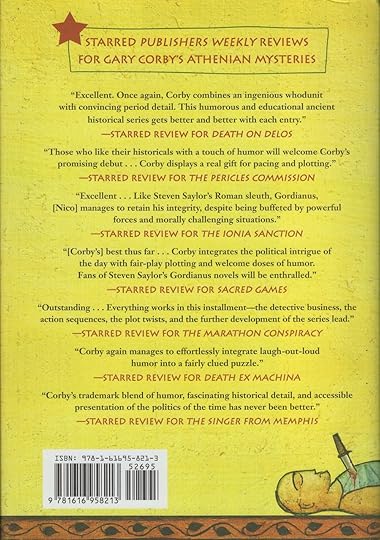
It is release day for the seventh Athenian Mystery. Never in my wildest dreams would I have predicted that I'd see this many books published.
This remarkable thing has happened because you, my dear readers, have very kindly read the books. For which I thank you.
The usual plan on this occasion is to show people the new cover. I'm going to do the reverse. Here's the back.
You are looking at the rear end of a book because my Esteemed Editor has listed one review comment for each book in the series. One review blurb for The Pericles Commission, one for The Ionia Sanction, one for Sacred Games, one for The Marathon Conspiracy, for Death Ex Machina, for The Singer From Memphis and for Death On Delos.
All these reviews have something in common. Every one of them is a starred review. Every. Single. One. In fact all the books have received starred reviews from multiple sources, but with a shortage of space on the back the publisher went with the well known Publishers Weekly comments.
Not that I as a working author would ever boast or anything like that, but I admit to being rather chuffed. Of course, having pointed this out, I have officially queered my luck and it pretty much guarantees that the next one won't be. On every new book I've privately promised my family that the next one won't star, because nobody's that lucky. But apparently I am.
So thank you to everyone who made the luck happen: my family, my agent, my editor, the zillion people inside a publisher who make a book happen, and thank you to you, too. Because ultimately, books happen because people read them.
July 2, 2017
Political Assassinations: the Big Ones
I thought just for fun I'd do a list of the political assassinations that had the biggest consequences for the world. So here we go:
Gaius Julius CaesarHard to go past this one for the top spot.
Caesar's death led to the official end of the Roman Republic and the rise of the first Roman Emperor, Octavian Augustus, who just happened to be Caesar's nephew and heir.
I think we can reasonably say the Roman Empire was kind of a big consequence.
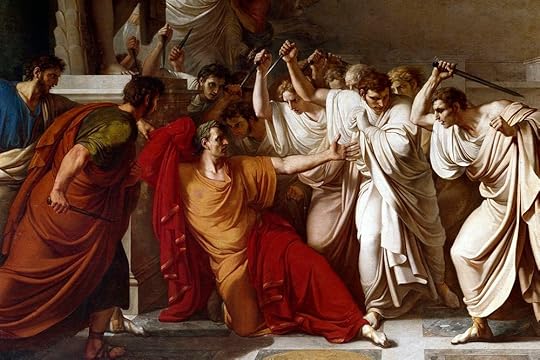
The Archduke Franz Ferdinand

A man defined by his death.
The otherwise forgettable Archduke managed to get himself killed by Serbian anarchists. Which he largely did by ignoring not only a lot of serious warnings, but also a previous attempt on his life on the very same day.
Unfortunately, since he was heir to the Austro-Hungarian throne, his demise kicked off a war which in turn started a domino effect of treaties that ended with World War One.
So that's about 38 million casualties right there that this assassination caused, plus the near destruction of Europe.
Philip II of Macedon
He was the father of Alexander the Great.
Philip was assassinated when Alexander was only twenty years old. Alexander spent the next thirteen years conquering the entire known world, and then himself died.
The world would be a very different place if Alexander had spent those thirteen years as his father's lieutenant.
You might argue that Alexander would have gone on to conquer the world after he inherited the kingdom anyway, but Philip was only 46 when he died. He might have lasted another twenty or thirty years. Which would have left Alexander inheriting at age 40 or 50.
So Philip's death at just that moment changed the world a lot.
Ephialtes

You've probably never heard of him, unless you've read my first murder mystery, which is about the death of this fellow.
Ephialtes created the first true democracy at ancient Athens, which in turn invented the whole idea of Western democracy. Not a small thing.
Ephialtes was promptly assassinated for his troubles, and here comes the part that makes his killing so significant:
Ephialtes had a lieutenant, a rather likely lad by the name of Pericles.
Pericles took the top job when his friend died, and that was the start of the peak of classical civilization that we call the Age of Pericles.
Carloman
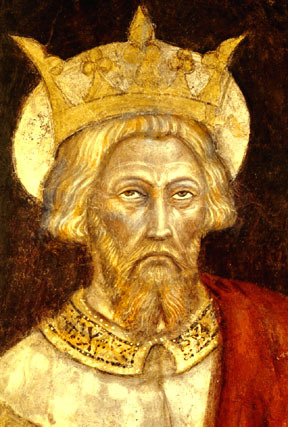
Charlemagne had a younger brother, which was very inconvenient because by the rules of inheritance at the time they were required to split their father's kingdom.
Charlemagne was particularly put out. He had plans to conquer Europe &/etc, and an uncooperative little brother was going to be a drag.
Then Carloman mysteriously died, still a young man, in circumstances that were never explained, and no cause of death was ever given.
It was very convenient for Charlemagne though. He promptly conquered Europe and founded the Holy Roman Empire.
Which probably would never have happened if Carloman had hung around. Charlemagne was never actually accused of arranging the assassination of his little brother, however this must be tempered by the observation firstly that Charlemagne was incredibly good at planning things, and secondly that only a crazy person would accuse the Holy Roman Emperor of murder.
Do feel free to add your favourite assassinations in comments. Somehow I have a feeling people will have their own lists.
June 1, 2017
Archaeological Detectives: an Emma Fielding Mystery, on TV
One of my colleagues in crime is Dana Cameron. Dana is a for-real professional archaeologist, but in her odd spare moments she also writes murder mysteries and supernaturals.
Almost inevitably one of her detectives is an archaeologist, called Emma Fielding, whose first adventure is called Site Unseen.
Site Unseen has been picked up and made into a movie for television!
Site Unseen is coming out from Hallmark in only a few days. If you want to see an archaeological detective written by someone who actually knows archaeology, this is your big chance.
Dana by the way has the most amazing New England accent, which people outside the US don't typically hear. She should totally be doing podcasts.

Dana Cameron

The detectives, as viewed if you happen to be the victim.
May 18, 2017
Worst treatment of a politician, ever
I'm going to avoid the toxic cesspit that is US politics, but I thought I'd comment on a recent assertion by Donald Trump that, "No politician in history ... has been treated worse or more unfairly."
Well he'd have some stiff competition on that. It set me to thinking about which politician in history did get the worst treatment.
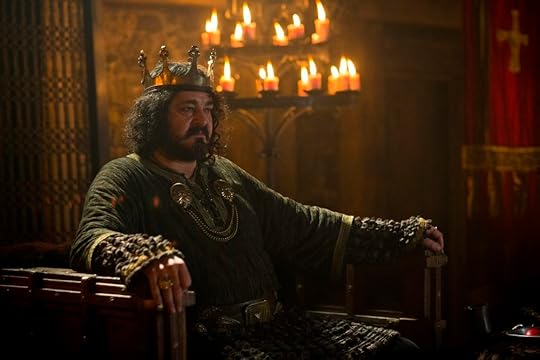
Back in the ninth century in the city of York, King Aelle of Northumbria had the skin of his back sliced down the middle; then they tore away the skin to expose his spine and entire back — all while he was still alive, mind you — then they used an axe to cut away his ribs from his backbone. The pressure on the cut ribs caused them to splay outwards away from the backbone, which must have been agonizing. This completely exposed all his internal organs. Then they put their hands into his body and pulled out his lungs. All this while he was still alive. But in this position, Aelle died.
This is called the blood eagle, because when it's over there's blood everywhere and the victim with his lungs lying beside him looks like an eagle with wings spread.
King Aelle is one of only two or three people in documented history to have had this happen to them. The other two were Viking princes, and the people who did this to Aelle were the sons of the Viking Ragnar Lothbrok.
It must be said that Aelle had previously thrown Ragnar into a pit of snakes. So there was not a lot of love lost on either side. On the other hand, having your lungs torn out through your back pretty much outranks anything that's happened to Donald Trump.
There is a superb TV series called Vikings, in which this unfortunate episode is portrayed. Don't watch this unless you have a strong stomach.
There are other candidates for worst treatment of a politician. I'd be interested to hear your nominations.
May 9, 2017
Death On Delos: a starred review from Publishers Weekly
Death on Delos is the seventh adventure for Nicolaos and Diotima, and as you can tell from the cover, Diotima is slightly pregnant!

I won't summarize the book for you, because the highly esteemed Publishers Weekly has done a sterling job of describing the opening disasters in their review, which you will find to the right.
You might notice it's a starred review. It's also the seventh straight starred review for this series. That's kind of a big thing in the publishing world.
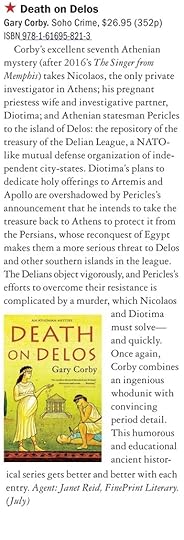
February 14, 2017
Beware the Ides of February: Cupid, Eros and St Valentine's Day
Today is Valentine's Day. Happy Valentine's Day!

St Valentine in a spot of bother
As an author of murder mysteries I feel I must point out that February 14 is Valentine's Day because it was on this day that the real St Valentine was beaten with clubs, stoned, and then had his head cut off. Not perhaps the most auspicious beginning for a day to celebrate love.

Oil Flask showing Eros as he plays the aulos
However that was during the Roman period and I am an author of classical Greek mysteries. There is a surprisingly strong connection between Greek mythology and our day of Love. It comes via Cupid, the little fellow with the arrows, who we see on so many Valentine's Day cards.
Cupid is the Latin name for the Greek god Eros. Here he is, from a vase at the Boston Museum of Fine Arts.
The wings for the little god of love were there right from the beginning. It's not shown here, but the bow and arrow are original equipment too. Some early pictures show the god blindfolded as he shoots his arrows, hence the meaning that love is blind, a common saying which is thousands of years old.
The earliest mention of Eros is, incredibly, from Theogeny, a book written by Hesiod in about 700BC. It was the first ever attempt to describe the Greek Gods. Eros gets a major mention.
Hesiod listed Eros among the very first of the gods, right at the start of Creation.
In the beginning there was Chaos. From out of the chaos came Gaia, the Earth, the foundation of all things. Then came dark Tartarus, the Underworld. And then came Eros, the god of Desire, who is fairest of all the deathless ones.
So Eros, our god of falling in love, is one of the most primordial of all deities. Zeus doesn't even appear for another two paragraphs.
Eros then reappears a little later in Theogeny, emerging from the sea behind his mother Aphrodite. Yes, I know that's a paradox. Eros arose before the Olympian Gods, but Aphrodite is his Mum. Welcome to Greek Mythology.
That, then, is the little deity who appears on our Valentine Day cards. Oh, and he helped start the Trojan War. But that's another story.
November 11, 2016
An unexpected election result
This seems a topical moment to talk about the world's first election that didn't quite go to plan. It happened in 416BC, or thereabouts, in ancient Athens.
Back then two men were vying for control of the city: Nicias and Alcibiades.
Nicias was a crusty old conservative General and an associate of Pericles. (Pericles had died thirteen years before.)
Alcibiades was a charismatic, handsome, intelligent, deceitful, self-serving and utterly untrustworthy distant relative of Pericles. If you think a combination of used car salesman and junk bond trader you won't be far wrong.
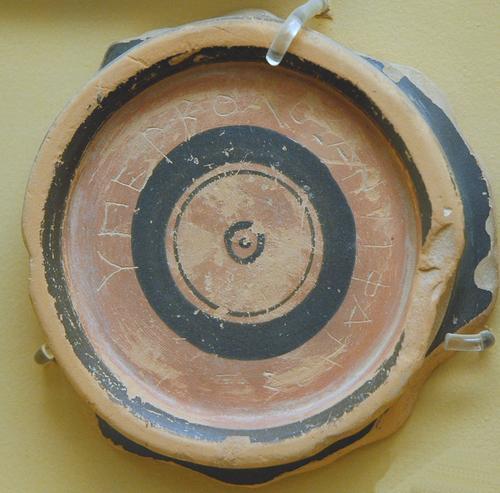
A vote against Hyperbolas, from the excellent site livius.org
To put it mildly, these two didn't along. They both controlled factions that between them were tearing apart the General Assembly, which was the world's first democratic parliament.
Now in Athens they didn't need elections to their parliament, because every citizen was his own representative.
But they did have elections to exile people from the city. This was called an ostracism. The way it worked was that once a year anyone could propose that there be an ostracism. If the Assembly voted in favour, then it was certain that someone was going to get tossed out, but no one knew yet who that someone was. They had to have a vote.
This was a vote you wanted to lose, since the "winner" was exiled for ten years.
On election day every citizen would write the name of the person they wanted to see gone. Whoever got the most votes was the loser. The voting slips were broken pieces of pottery, of which Athens had plenty since almost every type of food in every kitchen was stored in ceramic jars. The ancient Greek word for pottery shard is ostrakon. The vote was named after the voting slip: ostrakismos. Hence our English word ostracism is named for broken bits of pottery.
So Nicias and Alcibiades were causing lots of trouble, and everyone would be quite happy to see one or the other ostracised.
A dodgy minor politician named Hyperbolas, who wanted more power, realized he could make use of this. He proposed an ostracism. The followers of both Nicias and Alcibiades thought this was a wonderful idea, imagining the other side's leader being told to pack his bags. The vote passed easily.
It was at this point that Nicias and Alcibiades both became very, very uneasy. Neither was certain he'd survive the vote.
The two got together for a quiet chat, and probably through gritted teeth for the first time in their lives managed to agree on something.
They both told their followers to vote for Hyperbolas.
When the count was complete, Hyperbolas was the one who ended up being ostracized. Which probably isn't what he had in mind when he proposed the vote.
The result was such a shocker that the Athenians never again held an ostracism.
The voting slips when they were done with were used as landfill, since ceramic is kind of hard to get rid of any other way. Thousands of these ostrakoi have been dug up around Athens. The one in the picture has the name Hyperbolas written around the edge. This is one of the votes that did him in.
October 27, 2016
What is a stoa?
Nico & Diotima do a lot of lurking, and they mostly lurk behind the pillars of a stoa.
A stoa is a classical Greek portico. A stoa in classical Athens is where you go to see and be seen.
You would find people like Pericles and Socrates walking between these columns, under the shady roof, discussing affairs of state, or philosophy, or more likely passing on the sordid details of the latest scandal, and they would be surrounded by hundreds of like-minded citizens, all of them just hanging out.
You would also find Nico and Diotima behind the pillars, listening in on the conversations and going about their detective work. On most of the book covers they are drawn doing exactly that.
Here on the left are Nico & Diotima, with a stoa in the background (from the cover of The Pericles Commission).
On the right are two other dodgy characters. That's me and my wife Helen, in the reconstructed Stoa of Attalus, in the agora of Athens. We couldn't resist doing the cover shot.
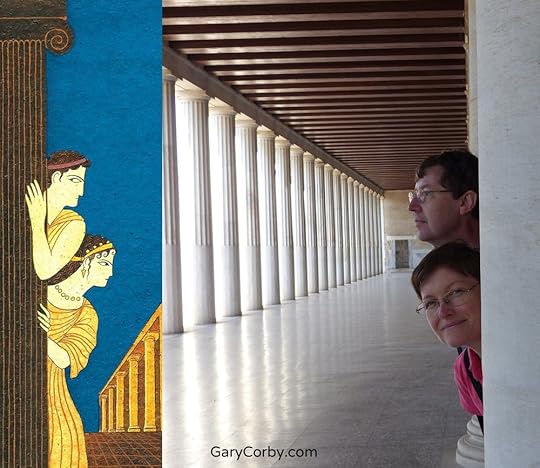
That stoa is a reconstruction built during the 1950s of a for-real one from classical times. It realy would have looked much like this.
Here's a view of the same building, taken from the Acropolis.

You need to remove the Byzantine church in the foreground. Then replace all the vegetation with a lot of vendor stalls, because that space to the left of the Stoa of Attalos is the ancient agora of Athens, which obviously has seen better days. If you then replace the buildings in the background with whitewashed daub double-storey dwellings then you have the center of classical Athens.



